Memoirs & Diaries - Retreat
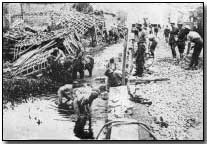 In the early hours of the
morning of March 22nd, 1918, our own front-line troops retired through us.
At the time we were occupying a shallow trench forming the support line
before Marcoing, in the Cambrai salient, and a little later we also
withdrew.
In the early hours of the
morning of March 22nd, 1918, our own front-line troops retired through us.
At the time we were occupying a shallow trench forming the support line
before Marcoing, in the Cambrai salient, and a little later we also
withdrew.
Our first halt was on the slope of a hill. We could not see the attackers, but their artillery plastered the hillside with shrapnel, and we were not sorry to get orders to move again. During the halt one of our officers handed me a bottle of whisky to "look after" for him. I did not see him again, but the whisky came in useful.
My company was leading, and we were under very heavy shell-fire for some time. As we passed through one village, evidently some sort of headquarters, the mixed assortment of clerks, storekeepers, and other oddments were making a hurried exit. A hundred yards or so ahead of us, a two-horsed wagon, containing stores and half a dozen men, had just started off when a shell burst, apparently immediately over it. We made a detour round the mangled remains of horses and men.
Although our latest spell in the trenches had only been the normal one of eight days, we had been relieved, had marched back to the reserve line, a distance of about eight miles, had immediately been exposed to a protracted shelling, with gas, and then, without food or rest, had returned to the line.
During the spell of trench life, too, there had been considerable activity; it had been difficult to get rations up when we were in the front line, and there had been no rest during our four days in support. The infantryman is a soldier by day and a navvy by night. Sleep is a luxury in which he is allowed to indulge only on rare occasions, and then for very brief periods.
We did not start on our long trek any too fresh. We marched all day, with very few and very short halts. A little after dark we came to some cross-roads, went straight across them, and very shortly after, walked plump into the arms of the enemy!
For several hours we had been marching at ease in apparent security, and were therefore taken completely by surprise on the first challenge in a foreign tongue. We scattered in open order on to the fields on either side of the road, and lay flat awaiting developments. A sergeant shouted out that he knew the place as the site of an Indian Labour Corps encampment.
An officer and one or two men went forward, calling out that we were English! and were promptly shot. The fight that followed remains in my recollection as a confused medley of bursting bombs, rifle and machine-gun fire.
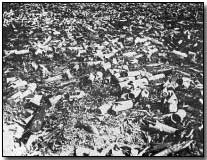 I
found a shallow hole in the ground, and from its shelter fired point-blank
at forms just seen in the darkness under the unmistakable squarish German
helmets, until my ammunition gave out.
I
found a shallow hole in the ground, and from its shelter fired point-blank
at forms just seen in the darkness under the unmistakable squarish German
helmets, until my ammunition gave out.
A form appeared, and Johnson's voice said, "I've got one in the thigh, old man." I felt the wet blood on his trouser-leg, but by the time I had fumbled for and found my first-aid outfit he had wandered off again. I heard afterwards that he acted as orderly in a German War Hospital.
Among the confusion of shouts, groans, curses, and the detonation of bursting bombs, I thought I recognized a voice calling for help as that of a company stretcher bearer and one of my pals. He was known as "Blanco," from which anyone acquainted with Army humour will at once realize that he had coal-black hair and a swarthy complexion.
I crawled towards the voice, and found its owner in a shell hole with five wounded whom he had collected by the exercise of I don't know what powers of sight and physical exertion. He bandaged their wounds in the darkness with my unskilful assistance.
Loud commands in German, and a sudden intensification of firing apparently from all sides told us that we were almost if not quite surrounded. The only chance seemed to be the road; obviously if the enemy were behind us there we were completely ringed round; if not, there might be an avenue of escape by the way we had come.
By the time we had got our wounded companions on to the road (I have no idea how), the enemy were pretty fully occupied in guarding and disposing of their captives. Luck favoured us, and we got clear. A few others, possibly a dozen, also escaped, as we found out eventually.
We had, of course, no idea as to the whereabouts of the remainder of our battalion, and when we reached the cross-roads any direction seemed as likely as another to lead us into trouble again. Providence, sheer chance, or a sense of direction led us to turn left.
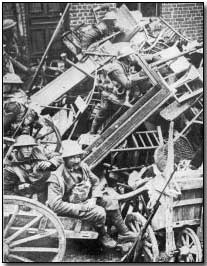 During
the rest of that night, and, I think, the whole of the next day we struggled
along. By good fortune we all escaped being hit by splinters from a huge
ammunition dump which had been fired by our engineers, and from which a
shower of red-hot metal rained down over a large area of the road and its
surroundings.
During
the rest of that night, and, I think, the whole of the next day we struggled
along. By good fortune we all escaped being hit by splinters from a huge
ammunition dump which had been fired by our engineers, and from which a
shower of red-hot metal rained down over a large area of the road and its
surroundings.
The noise of the explosions completely shattered the nerves of the most seriously hurt of our comrades, and it was almost impossible to control him. We got him past the blazing dump somehow, and I then remembered the officer's whisky. We all had a swig, and we poured a very generous quantity of the neat spirit down the delirious man's throat.
We had practically to carry him, after that, but he became quite quiet. He died an hour or two later, and we were able to leave him by the roadside. The other four needed more and more support as time went on, and our progress became a crawl.
I retained a few small personal belongings, my haversack and rifle, but had to discard the rest of my equipment. At last in the distance we saw a group of huts, but now also we came under sporadic machine-gun fire. It was not very heavy in our direction, and we got safely into one of the buildings.
In a field a little further on British troops were digging themselves in, but the space between them and ourselves was swept by bullets and it would have been suicidal to attempt to reach them.
One of our charges had been hit in the head; his mind now was wandering, and he was babbling and muttering. The other three were in some sort of shape to help themselves, and we decided that when darkness came on "Blanco" should try to get them across to "the line," and then if possible send someone to help me in getting the fourth over.
The first part of the programme was more successful than we had hoped. "Blanco" and his charges went off on hands and knees, hard knees, or hands and knee, according to where they had been winged, stumbled on to a sort of dugout, which they found occupied by our own American medical officer and a number of other casualties, and heard that the diggers-in comprised the other three companies of our own battalion!
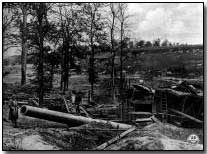 I,
of course, had no knowledge of what had happened to my companions at the
time, and it soon became apparent that there was very little hope of any
help reaching me, for the firing again became very heavy and the hut itself
was constantly being hit.
I,
of course, had no knowledge of what had happened to my companions at the
time, and it soon became apparent that there was very little hope of any
help reaching me, for the firing again became very heavy and the hut itself
was constantly being hit.
The effects of the whisky had long since worn off. I had had no other food or drink for considerably more than twenty-four hours, during most of which time I had been on the move and heavily encumbered. I could hardly remember when I had last slept. My companion became violent, and I had to sit on him to prevent him rushing out of the hut, which contained other occupants in the shape of two dead men. My vigil seemed interminable.
Towards morning I had practically given up any hope of leaving the hut alive, because it was obvious that sooner or later the enemy infantry would advance, and we were pretty certain to be "mopped up." I fished a piece of paper out of my pack and wrote a short farewell letter to my wife, in the hope that some decent German, finding it on my body, might manage to get it sent on.
Daylight came at last, and with it a slight lull in the firing. My comrade had sunk into a condition of lethargy, and I determined to risk the journey. We reached the M.O.'s dug-out; I think I carried my companion part of the way and dragged him the remainder. I never knew his name, and have heard nothing of him since, but I hope he got home safely. The M.O. was killed the same day whilst evacuating the wounded.
I joined the rest of the battalion. My first action upon reaching the half-dug trench was to tear up the letter I had written an hour or two earlier and thankfully scatter the pieces to the winds.
For the next week or so (one quite lost count of time) the retreat resolved itself into a test of endurance. The battalion managed to keep more or less together, but there was no pretence at any sort of order. Some had to drop out, either through exhaustion or wounds, sometimes stragglers from other regiments joined us or were overtaken.
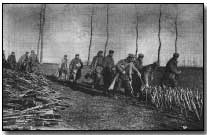 A
few were killed by the enemy's ubiquitous machine guns. The latter were
always more or less at our heels (and as often on our flanks), but, after
all, bullets drill a fairly clean hole, and one does not mind them - much.
The thought of great gaping wounds caused by jagged bits of shell, to say
nothing of the shattering of nerves by concussion, is a different thing. The
absence of shell-fire was our one cause for self-congratulation.
A
few were killed by the enemy's ubiquitous machine guns. The latter were
always more or less at our heels (and as often on our flanks), but, after
all, bullets drill a fairly clean hole, and one does not mind them - much.
The thought of great gaping wounds caused by jagged bits of shell, to say
nothing of the shattering of nerves by concussion, is a different thing. The
absence of shell-fire was our one cause for self-congratulation.
In some ways the attackers probably had a worse time than we. To a certain extent we could and did choose our own places and times for halting and showing fight. Our artillery, too, frequently continued to fire over our heads almost until we reached the guns.
The enemy troops, however, probably did get some rations. Our food was such as we could "scrounge" from deserted canteens and Y.M.C.A. huts, when anything had been left by those who had preceded us: perhaps a few biscuits, a packet of chocolate, or, as happened on one occasion, a tin of pineapple chunks.
We were badly troubled by thirst; there seemed to be no water anywhere except that collected in shell holes, stagnant and impregnated with gas. Eventually we were driven to crawling about in the early mornings and licking the dew off the grass.
But the almost insupportable hardship was the lack of sleep. The longest uninterrupted spell I remember was one of about a couple of hours, wedged with three fellow slumberers between the outstretched fore and hind legs of a dead horse (for shelter from a biting wind), its belly for a pillow and the cobblestones of a village street for a bed. For the rest, we dozed as we walked, or fell asleep, willy-nilly, whilst making some sort of cover, only to be prodded into wakefulness almost immediately in order either to move off again, or to be ready to repel an attack.
There was no lack of ammunition, for cartridge-belts, haversacks, and other equipment, even rifles and smashed Lewis guns, were lying about in the wake of the retreating troops, whose physical exhaustion was such that an extra pound or two in weight might mean the difference between capture and liberty.
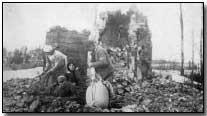 Sometimes
we were in open country, sometimes we took to the roads, but night and day
we tramped on.
Sometimes
we were in open country, sometimes we took to the roads, but night and day
we tramped on.
I found somewhere a rake-handle, and but for this third leg probably could not have stayed the course. I walked the soles off the two pairs of socks I was wearing, and raised blisters on my feet which gave me hell until they burst.
We passed over the old Somme battlefield, a desolate stretch of overgrown and fallen-in trenches, with rusty barbed wire, old tins, and other "junk" scattered about. We crossed the river - the Aisne, I suppose - near Albert, and halted on a grassy plateau on the far side of the town.
One of the historians of the War says: "At eleven on that date [March 27th] an inspiriting order was sent along the line that the retreat was over, and that the Army must fight out the issue where it stood. It is the decisive call which the British soldier loves, and never fails to obey."
Our old colonel didn't put it quite as nicely as that, but he was a sportsman, we liked him, and we appreciated his way of delivering the message. Strictly expurgated, it was, as near as I can remember, as follows: "Now, you men, that's Albert, and this is as far as we go. When the Boche tries to come through the town, as he will, we attack. There's to be no more retreat, and no surrendering.; What the hell are you going to sleep for?"
He walked in front of our ragged line as we advanced to the attack, and gave the signals by a wave of his cane. We had no cover, and advanced in open order under a terrific machine-gun and rifle-fire - a few paces forward, then flat on the ground, then on for a few yards again. I had a foolish notion that if I had an umbrella I should feel safer.
I have not yet read an account of troops attacking whilst asleep, but this was true of many of our men. The man on my left was fast asleep immediately on throwing himself prone, and on each upward wave of the colonel's cane I had to prod him awake with the butt of my rifle.
My "tin hat" was hit twice. A bullet pierced the exact centre of the top of the helmet of the man on my right as he walked forward with head down. He spun round as he fell, and with a stream of blood spurting out of the circular hole in the top of his head, scrambled back on hands and knees for perhaps 10 yards, and rolled over. A short, white-haired lad rushed screaming right along our line, with an eye shot away.
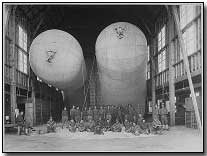 As
we threw ourselves over the edge of the plateau to the ploughed land below,
another near neighbour was hit in a most painful part of the body, and lay
in the ditch at the foot of the slope, screaming.
As
we threw ourselves over the edge of the plateau to the ploughed land below,
another near neighbour was hit in a most painful part of the body, and lay
in the ditch at the foot of the slope, screaming.
Very few of us reached what shelter the ditch afforded, and it was impossible to advance further. Our casualties already were very heavy. Eventually, with four others I reached a shell hole which provided some sort of reasonable cover, and from there, and a few other similar posts of vantage, those of us who were left managed to check any further advance of the enemy. One of us had a penny stick of chocolate, which he divided into five pieces, and which formed our sole nourishment for many hours.
If Alf's magic button had suddenly come into my possession, I should have thus addressed the attendant genie: "Send up immediately large reinforcements of fresh troops - not ragged scarecrows like ourselves, mind, but real live soldiers, and let them be Colonials."
No magic button was needed. Up they came, rank after rank, clean, shaved, in spick and span uniforms, properly tanned. The awed exclamation of one of my shell-hole companions seemed to sum up our feelings to a nicety. "New Zealanders!! Well, Gawd help Jerry!"
Private R. G. Bultitude joined the 1st Battalion Artists Rifles in 1917, and served on the Western Front until May 1918, when he was severely wounded whilst occupying an outpost in Aveluy Wood. The stretcher bearer referred to in the narrative as "Blanco" came over, in broad daylight, bandaged his wounds, and carried him to safety in circumstances involving the risk of almost certain death.
First published in Everyman at War (1930), edited by C. B. Purdom.
Photographs courtesy of Photos of the Great War website.
The "linseed lancers" was the Anzac nickname assigned to members of the Australian Field Ambulance.
- Did you know?
